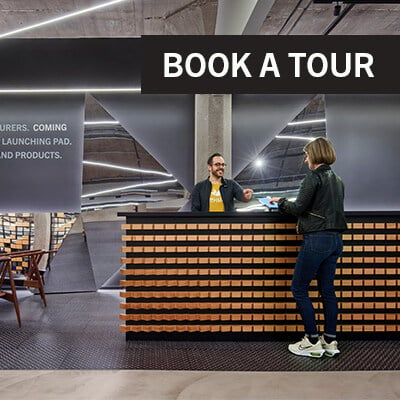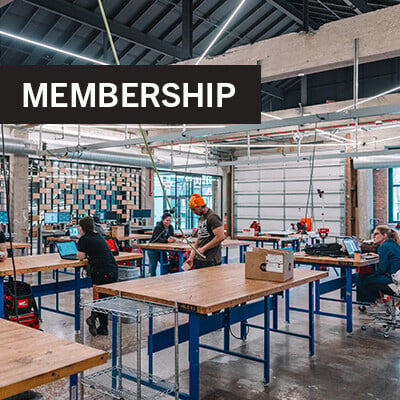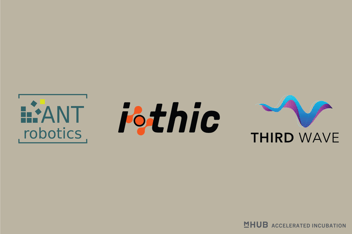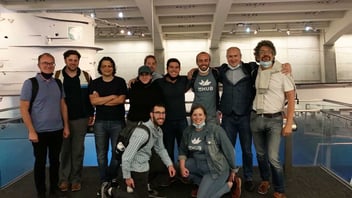Each IIoT team taking part in the mHUB Accelerator has chosen a core focus that drives them to succeed every day.
This week, mHUB sat down with three teams that put workplace efficiencies at the core of their startup. Get to know a little more about Compocket, Maxwell Labs, and Propulsioneers from their founders Ilayda Buyukdogan, Jacob Balma, and Chris Martellotti.
Where did your idea and value proposition begin?
 Buyukdogan: We came up with the idea almost four years ago in a school’s electronics lab when we were studying electronics engineering. We realized that the test and measurement devices were huge, expensive and offered an outdated, poor user experience.
Buyukdogan: We came up with the idea almost four years ago in a school’s electronics lab when we were studying electronics engineering. We realized that the test and measurement devices were huge, expensive and offered an outdated, poor user experience.
 Balma: While working as a Performance Engineer at Cray, a company which designs and manufactures the world’s largest supercomputers, our team was constantly faced with the challenge of benchmarking large scale systems to ensure they were operating at peak performance once they were installed at a customer’s datacenter location. Liquid Cooling infrastructure was always a requirement for the supercomputing product line, and it was a major barrier to entry for many organizations that would have otherwise liked to own a Cray system. The problem isn’t just the cost of the cooling infrastructure. The basic mechanism of the cooling technology we use today – pushing air or liquid across hot surfaces – has been pushed to its limits in these systems and sets hard limits on the size of the machines relative to the space that must be used to house them. Maxwell Labs was born out of the idea that future cooling technology must inevitably be optimized for the only other physical mechanism by which heat can be dissipated from an object – radiation – in order for humanity to continue to scale it’s compute capabilities. It just so happens that the technology we’ve already developed significantly improves the efficiency of datacenters by reducing pressure on their cooling systems – which is our primary value proposition for customers today.
Balma: While working as a Performance Engineer at Cray, a company which designs and manufactures the world’s largest supercomputers, our team was constantly faced with the challenge of benchmarking large scale systems to ensure they were operating at peak performance once they were installed at a customer’s datacenter location. Liquid Cooling infrastructure was always a requirement for the supercomputing product line, and it was a major barrier to entry for many organizations that would have otherwise liked to own a Cray system. The problem isn’t just the cost of the cooling infrastructure. The basic mechanism of the cooling technology we use today – pushing air or liquid across hot surfaces – has been pushed to its limits in these systems and sets hard limits on the size of the machines relative to the space that must be used to house them. Maxwell Labs was born out of the idea that future cooling technology must inevitably be optimized for the only other physical mechanism by which heat can be dissipated from an object – radiation – in order for humanity to continue to scale it’s compute capabilities. It just so happens that the technology we’ve already developed significantly improves the efficiency of datacenters by reducing pressure on their cooling systems – which is our primary value proposition for customers today.
 Martellotti: By looking at the combination of hardware and software we think that there will be a lot of opportunities. Many fundamental hardware components are centuries old, and we feel that by reinventing this for the future of computer operations can have a profound impact.
Martellotti: By looking at the combination of hardware and software we think that there will be a lot of opportunities. Many fundamental hardware components are centuries old, and we feel that by reinventing this for the future of computer operations can have a profound impact.
Tell us about the growth you’ve experienced since your launch.
Buyukdogan: We had offices of different sizes in different countries, worked with people from many different backgrounds, and overcame many different difficulties from team management to supply chain management. We grew up with our company and I would say today we’re both more mature.
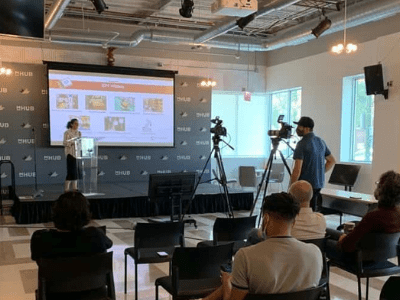
Balma: Although we officially launched in 2020, we’ve been working on the technology since 2018 in one form or another. It’s been incredible to watch our operations move from basement shops and into bonafide laboratories and manufacturing facilities like those here at mHUB. The equipment to scale our thermal compounds and develop the next generation of radiative cooling technology was a major challenge early on, and so it’s been amazing to watch how our capabilities have expanded as we grow. In the last year, we went from having a single pilot project in Minnesota to having several customers, in addition to multiple paid pilots across the country. We’ve seen exceptional growth with customers doing crypto-mining specifically, where our products are leading to a 15% reduction in their cooling costs, improving the profitability of their mining operations overnight.
Martellotti: We have had interest across many different industries which has us excited. Agriculture, Medical Devices, and also robotics is where we are seeing initial traction.
What does the future look like?
Buyukdogan: It is very hard to make a guess for the future in an early-stage startup like us especially during today’s rapidly changing environment. In the future, I see more partnerships and collaborations.
Balma: The future for Maxwell Labs looks bright. We live in such an incredible time in human history and feel extremely lucky to be part of developing the technologies that will transform the world. In the future, we see Maxwell Labs leading the charge to build the infrastructure for a new class of data centers and supercomputers, designed for the 21st century. In this future, the massive amount of heat produced by the world’s data centers, currently being dissipated into the earth’s atmosphere and pumped into its oceans, will instead travel silently through the windows of the building as light, and pass freely through the atmosphere and into the vacuum of interstellar space.
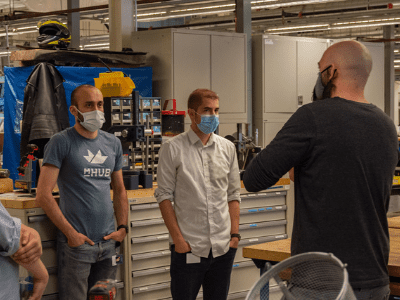
Martellotti: We are excited to start developing applications on top of our core IP. This will allow us to test these new devices in the wild with potential customers and ramp up the business across many different sectors.
A lot of the work done on efficiencies has focused on the use of sensor technologies; your product and service is taking a different path; is it complementary or replacing what sensor technologies would offer?
Buyukdogan: Right now we’re working with test and measurement devices that are complementary to sensor technologies. Today having access to the measurement data and making a meaningful output out of it is very crucial.
Balma: It’s definitely complimentary. In fact, the materials we use to achieve radiative cooling can be used simultaneously as sensors to stream data about the distribution of temperatures at every scale within a data center, from the transistors on a chip to the stack of servers in a rack. By capturing this data and feeding it to machine-learning models – our software can predict hot-spot formation at the level of a microprocessor, identify anomalous power distributions across a set of accelerators within a server, or help optimize airflow at the level of an entire cabinet. In some sense, careful tuning of these material properties allows for the “eyes” of emerging artificial intelligence technologies to be anywhere. But we’re keeping our focus on computers, for now.
Martellotti: We think that sensor technology is the first step in measuring the efficiency or inefficiency of machinery. As product designers look to develop more efficient machinery we feel that our building block technology will be key components of the machines of the future.
Keep up with Compocket, Maxwell Labs, and Propulsioneers by visiting their websites. If you’re an investor and would like to get in contact with one of these teams, send an email to thierry@mhubchicago.com. If you are interested in being contacted about the next open application window for the mHUB Accelerator, complete the interest form below.
